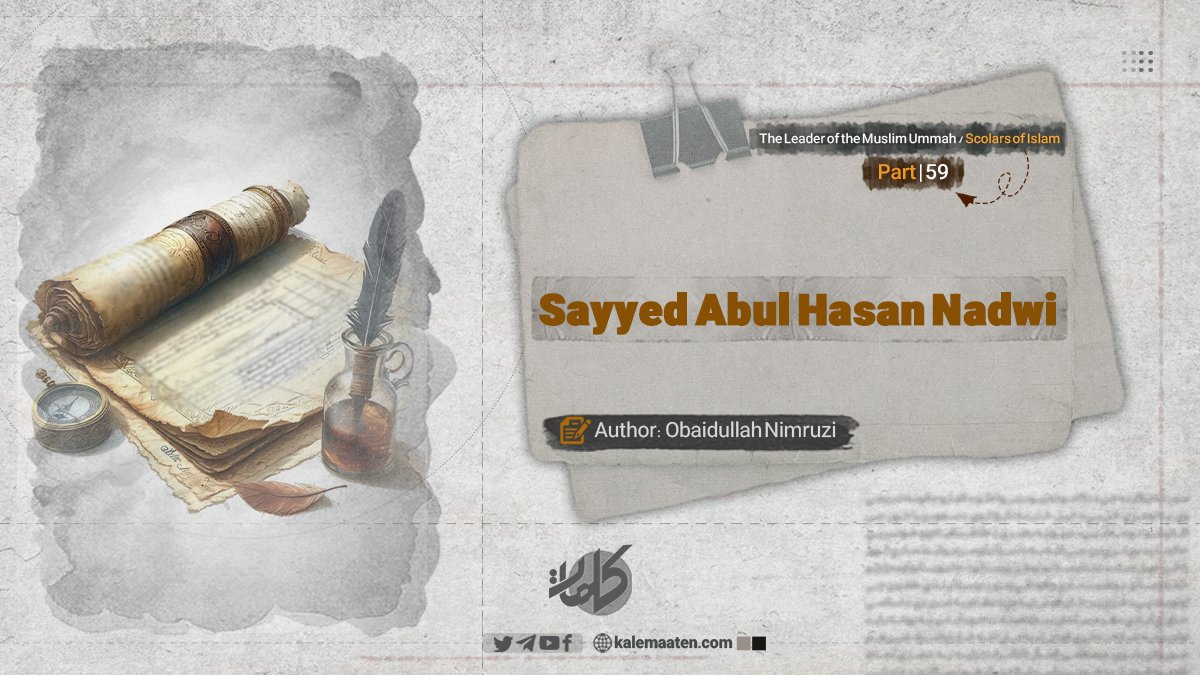
Author: Obaidullah Nimruzi
Allama Sayyed Abul Hasan Nadwi ‘may Allah have mercy on him’ (Part 59)
Meeting with King Hassan II of Morocco
As mentioned, all of Mawlana’s concerns were to meet with kings and rulers, convey the true message of Islam to them, enumerate their religious and faith shortcomings, and call them to reform. In his meetings, he always tried to speak in favor of Islam and Muslims while revealing the truth to them.
Mawlana Nadwi stated the following in his meeting with King Hassan II, the Hashemi King of Morocco, in 1976: “I am fortunate to deliver to you a precious message from the Islamic world, which I feel is a burden on my shoulders and a trust. This is the responsibility that Muslims from East to West are waiting for: a new star to rise from the edge of the world to be the meeting place for their aspirations. Muslims are in a miserable, difficult, and strange situation and need a zealous, faithful, and brilliant leader distinguished by sincerity, certainty, firm determination, and a confident heart.”
The purpose of Mawlana’s words was to highlight the needs of Muslims and to express the qualities of an exemplary leader, who embodies the sentiments of the heart through heartfelt expressions.
Meeting with King Abdullah of Jordan
Mawlana Nadwi met and talked with King Abdullah bin Sharif Hussein, the King of Jordan, several times. Once, after Mawlana returned from Jerusalem in 1951, King Abdullah specially invited him. During this trip, Mawlana sat with the king and informed him of the responsibilities he bore in a wise and insightful manner. He specifically made him aware of the importance of Jerusalem, Al-Aqsa Mosque, and his responsibility toward Palestinian refugees.
Dr. Sayyed Rezwan Ali Nadwi writes, “In 1951, after returning from a trip to Syria and Jordan, Mawlana narrated the story of his meeting with King Abdullah, King of Jordan, in Medina as follows: When the King of Jordan came to meet me, after greeting him, I read him the famous poem by Sharif Razi, a Baghdadi poet of the fourth century AH, in which he addressed the Abbasid Caliph: ‘When it comes to pride, remember that we both share in relative superiority. The difference is that you attained the caliphate, and I was deprived of it.’”
Imam Nadwi met the king with complete self-respect and self-sufficiency. In expressing relative characteristics, he pointed out the king’s responsibilities toward the Islamic Ummah.
Mawlana Nadwi writes, “After the first meeting, I met him again three days later. We both prayed Friday prayers in the great mosque of the city. When the king saw me, he invited us to have dinner. During this meeting, the book Maza Khasar al- ‘Alam Be Inhetaat al-Muslimeen (What Did the World Lose with the Decline of Muslims?)—which I had presented to him during the first meeting—was read by the king. He provided a thoughtful analysis of it. I once again drew his attention to Al-Aqsa Mosque and the Palestinian refugees and presented him with two other books.”
Meeting with Shaheed General Zia-Al-Haq
General Zia-Al-Haq, one of the most distinguished rulers of his era, had a conscious and spiritual heart filled with love for the truth. He was a shining crown and star among the righteous kings until the last breath of his life, embodying a lifelong devotion to the people of knowledge and the seekers of truth.
Whenever Hazrat Imam Nadwi set foot in Pakistan, General Zia-Al-Haq’s admiration for him deepened, and he was eager to meet him. Imam Nadwi, like refreshing water, soothed the inflammation in his heart and guided him with his views, writings, and strategic advice in the realms of religion, faith, determination, and sincerity.
Professor Dr. Sayyed Abul-Khair Kashfi writes: “Hazrat Mawlana Nadwi came to Pakistan for twenty-four hours. When the news of his arrival reached General Zia-Al-Haq, he called and said: ‘Please come to Islamabad for three or four hours; the army plane is ready for service.’ Mawlana Nadwi replied: ‘This little time is entrusted to my other loved ones. Please accept my apologies.’ Therefore, General Zia-Al-Haq himself came to Karachi.”
Despite the mistakes he made during his rule and his failure to fully implement an Islamic system in Pakistan, Zia-Al-Haq was deeply sincere and humble. When he asked Mawlana Nadwi to assign him azkar (remembrances) and awrad (daily practices), Mawlana advised: “You should always send blessings and salutations to the Prophet (peace be upon him) and remain dedicated to your work. That is enough for you.”
Continues…



